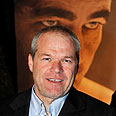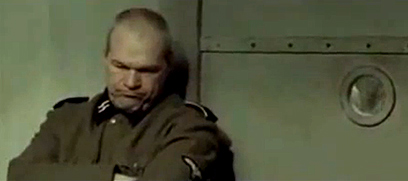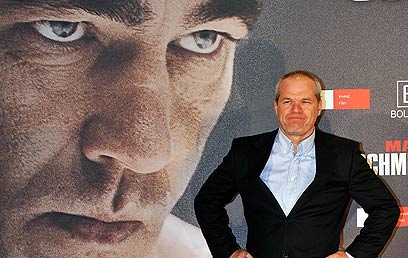
'Auschwitz' director: Germans hate me
Many call him 'world's worst director', but Uwe Boll is convinced that his film 'Auschwitz' exposes Nazi killing machine's methods in most authentic manner. 'It may be tough for survivors to watch, but they'll agree that it's important,' he tells Ynet
The German director, who began his career in cinema with some pretty foolish movies adapted from video games, changed direction in recent years and began making "serious" films with political and ethical messages, such as "Stoic" and "Darfur".
'Raging Boll' documentary. Uwe against the world
But in spite of his good intentions, the critics who never liked him continued to speak badly of him. The "world's worst director", as many refer to him, is forced to deal with what seems like a media hell.
In the past year, the angry and degrading responses increased upon the release of "Auschwitz", his controversial film, which describes the systematic killing at the Nazi concentration camp in a particularly blood-chilling and graphic manner.
Boll, on his part, just wanted to re-evoke the memory of the Holocaust, but was ignored once again. The road to this hell – the Nazi killing enterprise – was paved with his good intentions as well.
The "Auschwitz" trailer sparked angry responses in Germany and worldwide, but Boll clarifies in a special interview to Ynet that in the film himself, during which we see "a normal day in a concentration camp - from the train into the oven", the real horror is the Nazis' quiet and efficient systematic ways.
The film also criticizes the ignorance of young Germans about the Holocaust, through interviews held with several high school students. "It's shocking that they really don't know a lot about the Holocaust," he says.
Warning: 'Auschwitz' trailer contains graphic footage
"I felt that all the movies about the special heroes or stories in regards to the Holocaust never really showed what it really was like. It was the biggest organized killing of humans in history," explains 46-year-old Boll.
"I think that already at least half of the planet doesn't know anything about the Nazis and the genocide – so it is easy for deniers to succeed.
"I think that if you watch all the movies about the subject matter in the past 50 years, you will never see what it really was like. This is the reason I made my movie focusing on the actual killings – the manufacturing of death."
Aren't you afraid that the film will be perceived by neo-Nazis are pornography of death?
"Nobody will laugh about the movie and no Nazi will enjoy the movie because the movie is not like the teaser. The movie is more silent, depressing. It shows a calm killing factory without an exit possibility. And it is not like a gore movie."
Total recall
The film's slow, quiet and depressing pace may prevent bloodthirsty people and those fond of extreme vulgarity from enjoying the film, but there are those who believe – quite justifiably – that the harsh sights may hurt the feelings of the remaining Holocaust survivors.
"The reason for the movie is to not forget," Boll explains his motives. "The movie is made for the people who deny or don't know enough about the holocaust. It will possibly be tough for survivors to watch that movie, but I think they will agree that the movie is important."
Did you consult Holocaust survivors while producing the film?
"We actually had a survivor in the gas chamber, and he was overwhelmed with the situation. If you see the movie, he is the old man just standing there while everybody was flipping out.
"I think the survivors are the biggest supporters in showing it without emotions and without story. This hits you harder than to watch an emotional story."

Naturally, Boll's work on the set of "Auschwitz" was not easy, and he was forced to deal with quite a few emotional challenges. One of them was taking part in his films as an actor for the first time.
"I realized that our Croatian extras had problems to really get naked and into the gas chamber, and my 'Nazi' actors were not harsh enough getting everybody undressed," says Boll, who is also seen in the trailer portraying an SS officer. "This was the reason I got into a uniform and did the part, to get it realistic."
You claim that young Germans are ignorant when it comes to the Holocaust? Where do you get this knowledge?
"I grew up reading books about World War II, and in school we also studied a lot about the Holocaust. Of course I watched all the movies and documentaries about it, especially the BBC, which did a very good six-part documentary.
"I also liked 'Schindler's List' and 'The Pianist', like other great movies dealing with the Holocaust. They are also the reason I felt there is one movie missing which just shows the daily routine and the actual killings."
'We haven't learned a thing'
According to Boll, his main motive for creating "Auschwitz" was the process of pushing the Holocaust away from the German agenda. He believes this is also the main reason for Germans' reservations against him and for the Berlin Film Festival's decision to reject the movie.
"They hate me for the movie, because it shows no German heroes," he says.

"The SS guards are shown realistically – they did their job and it was a calm, silent atmosphere. So now German festivals don't want to show the movie because the Germans look bad.
"Germans like movies about Claus von Stauffenberg (who conspired to assassinate Hitler and failed) or Sophie Scholl (who resisted the Nazi regime and was executed) because they were German heroes who stood up to Hitler."
What would you like to change in the modern German cinema?
"German filmmakers focus on the resistance fighters or the people that went against Hitler. I think school kids in Germany today don't care about the Holocaust anymore and/or have no clue about it."
(It should be noted that before "Auschwitz", Boll himself produced a film about boxer Max Schmeling, who also opposed the Nazi regime).
Does the criticism against you weaken or strengthen you?
"Because of my image I'm in a bad and a good position: Bad because everybody is prejudging me, but good in regards to my ability to make uncensored, ruthless, harsh movies, uncompromising my ideas. I'm very stubborn, and not diplomatic.
"I have made some extremely good films. It's too bad that Israel hasn't bought them so far. I hope an independent label in Israel will finally buy my movies and also 'Auschwitz'. I have never been to Israel and would love to visit."
Boll also has 'Blubberella', a heavyweight hero against the Nazis
Boll's attraction to the injustice of humanity throughout history is not just limited to Germany of the 1940s. "Darfur," another controversial film of his from 2009, deals with the West's poor handling of the genocide taking place in Sudan by the Muslim government.
"'Darfur' was a subject matter that I think shows how we handle genocide wrong and that we still don't step up against inhumanity. I don't get it why against (Sudan President) Omar al-Bashir and his racist Janjaweed we have done nothing for years."
'Darfur' trailer. Holocaust – not just in Europe
The fact that the West is intervening in the conflict in Libya, while ignoring the one in Darfur, angers Boll even more.
"I don't accept that right now that NATO bombs Libya without any plans or knowledge about the rebels. The US says it's a question of humanity to help the rebels, but in Darfur 350,000 people got hacked in pieces and nobody is doing anything.
"Why aren't we doing anything against Saudi Arabia, which clearly finances al-Qaeda and still executes people in public? (Libyan leader Muammar) Gaddafi is an idiot and a terrorist but by far not as gruesome against his people as the Saudis or (Sudan President Omar) Bashir."
So the Germans are not the only ones to blame. We all suffer from numbness when it comes to genocide in other places.
"Of course there are similarities between the situations – then and now. I ended 'Darfur' with the following text: 'That we didn't stop the genocide in Darfur shows that we haven't learned anything from history.'
"I think after Auschwitz, we have the duty to stop genocides wherever they happen."
- Follow Ynetnews on Facebook










